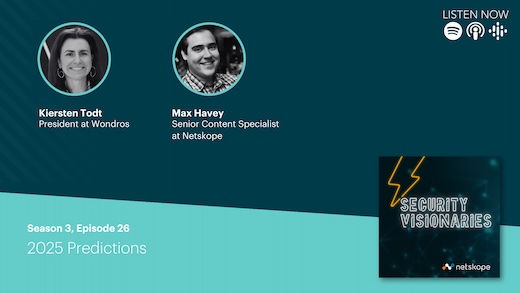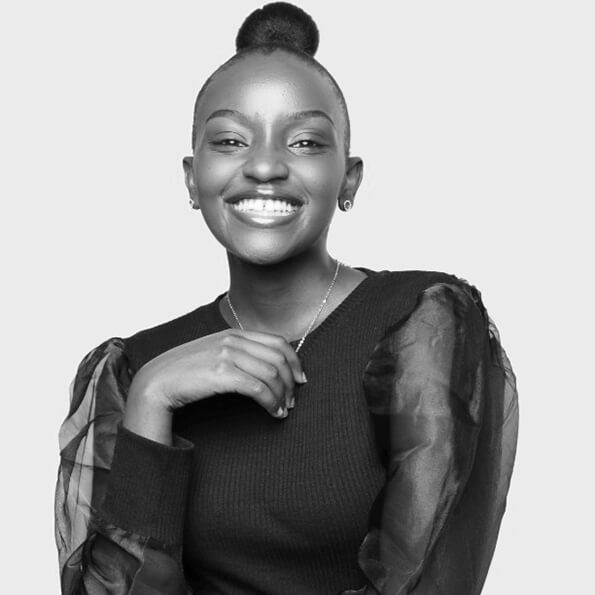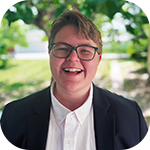Emily Wearmouth [00:00:02] Hello and welcome to today's episode of Security Visionaries, a podcast for anyone in the cyber data or adjacent industries. Today, I've gone out of my way to collect a geographically diverse guest list because I wanted to try to explore the realities of experiences in a sector that's really trying hard to improve diversity. Away from some of the dark comment threads on social media, there is general agreement that diversity is a good thing, but most employers profess to be trying to encourage more diversity within their teams, and it's not always clear whether their efforts are making a difference. When we discuss topics like this, we tend to hear from senior folks. They try and explain the challenges that they face and they work hard to defend their progress or lack of. But what do the newbies think? What has been the experience of people who we successfully attracted to our industry over the past five years? Let's find out. I'm going to start by introducing my guests. Our early bird is Ally Frane, and she's joining us very early in her day in the US Midwest. Ally is a supervisor in Netskope's Security Operations Center, and it's her third SOC role within an international company. She graduated from university back in 2018 and has a degree in computer information technology, which includes a minor in computer forensics, which I think sounds incredibly cool. Welcome, Ally. Thanks for taking the time to talk to us before you've even had any breakfast.
Ally Frame [00:01:18] Hi, all. I'm glad to be here.
Emily Wearmouth [00:01:20] I'm keeping my second guess from her lunch because she's joining us from Nairobi in Kenya. Jacklyne Mbuthia is a cyber security engineer working for Cyber guard Africa. She has so many side projects that I would need another 10 minutes if I was going to list them all here. But suffice to say she's highly involved and ambitious for the future of African women in our sector. She has a degree in mathematics and computer science from the Jomo Kenyatta University, and she graduated more recently in 2021. She's also an alumnus of the Cyber Safe Foundation whose mission is to ensure inclusive digital access in Africa. Welcome, Jacklyne.
Jacklyne Mbuthia [00:01:53] Thank you so much for having me here.
Emily Wearmouth [00:01:56] My final guest really ought to be in bed by now because she's joining us from Melbourne, Australia. Sam Van Stokrom is one of Netskope's solution engineers and she joined straight from university. She's actually still in the process of completing her degree in cybersecurity and law. Welcome, Sam.
Sam Van Stokrom [00:02:11] Thanks, all. Happy to be here.
Emily Wearmouth [00:02:14] So I'm going to dive right in with my first question because I want to know how you all ended up working in cybersecurity. I want you to cast your mind back to when you're at school, because we just heard that you did all choose to go to university to study for tech degrees. So what made you think, yeah, that sounds all right. I think that might be a good career. I am going to start with you, Sam, please.
Sam Van Stokrom [00:02:34] I've always been pretty interested in technology and video games and that sort of space. Growing up, it's always been something of a passion of mine. And when I was younger, me and my dad used to build computers together. And so that's always been sort of an interest. Originally, when I was going through high school, I wanted to go into law, but I knew that I wouldn't get a score at the end of university high enough to get into that degree. And so as I was looking, I saw cybersecurity on Deakin University's website, which is a university here in Melbourne. And I thought, yeah, that sounds pretty interesting as I read through the course description and what sort of modules and units it would have and teach. And so I applied for that and then yeah, I got in and here we are.
Emily Wearmouth [00:03:22] And the rest is history. I guess the secret there is have a dad that's or a parent that is already into computers and that and has kit that you're allowed to play on.
Sam Van Stokrom [00:03:31] Yeah, that definitely helps. And quite a few of my brothers were also into gaming as well. So I remember sitting there with our PS1 and playing, you know, Bomberman and Spyro and stuff.
Emily Wearmouth [00:03:40] Brilliant. What about you, Jacklyne? What made you say, Yeah, I'm going to I'm going to dive into the world of computing.
Jacklyne Mbuthia [00:03:48] I actually say, cyber is a whole space for introverted kids and speaking for all introverted kids, we all know that our life is to be behind the computer screen. So growing up, I'd experience a lot of computer to just do a few things hand down. And then when I went into high school, I feel like that is where everything shaped my life. So I was exposed to computer contests and events where I would be challenged to develop applications. It fueled something in me that I didn't know existed, and since then I was like, I want to understand all this and how it's all developed. I became a software developer for long enough to understand that I like this, but it's not really my future. Like, I don't see myself in five years doing the same thing. So I wanted something different. So I decided to transition to cybersecurity. And honestly, I found home. Cybersecurity is home for me because the fulfillment that comes with my career is incomparable to when I used to be a software developer. So I really love the life here and I am so happy that every single step or decision that I made towards my dream cemented that I'm actually on the right path. Going into programing school, picking out my degree, even deciding to transition careers every single step affirmed that I was actually in the right path.
Emily Wearmouth [00:05:00] Brilliant. So I suppose that the lesson from you is firstly competition. We like a bit of a competition. It gives people access to something and then making it easy for people to move. Find something that appeals and then build on that to find their right sector within computing. Alright Ally, it's going to be the same question for you, please.
Ally Frame [00:05:18] Yeah. So how I got into tech, it was interesting. So in high school I was in a gym class and I ended up hurting my shoulder. I ended up needing surgery, so I had to drop out of my gym class and the only other class that was able to fill that slot was a web development class. So I fell in love with it. And there was when I was the 10th girl in the class so that we could actually have the class. So it was complete accident that I actually ended up in the thing. I did some other tech camps around my hometown and then eventually declared as a computer science major to college, quickly realized, Computer science isn't me. I'm really bad at math. So I saw a posting for the collegiate cyber defense team on Blackboard, like a messaging center for campus. I went to that team meeting and was like, Hey, cyber security seems pretty cool. So I ended up switching my degree over to I.T. with a focus on network security and the computer forensics minor.
Emily Wearmouth [00:06:27] Awesome. I mean, there's so many lessons to take from you is one physical damage to the body is a great way into cybersecurity, ultimately. I also noticed if you hadn't have done that, then they'd have potentially been nine women that we wouldn't have in the industry today because we weren't reaching that minimum threshold for your school to offer it as a course, you know, because it wasn't wildly appealing enough. I think that's something worth taking note of. But the other thing I wanted to pick up on that you said you hated maths. There's an awful lot of discussion from people across the educational spectrum about the importance of increasing girls involvement in STEM subjects. Here in the UK. Our Prime Minister goes on about STEM all the time, about how important it is, and we hear about a lack of girls studying STEM subjects of science, technology, engineering, maths at school is often used as an excuse for the poor level of female representation within our industry. So I'm just going to ask you all flat out, did you like STEM subjects? Ali Well, you sort of answer the question already.
Ally Frame [00:07:26] Yeah, obviously I really didn't like them know, they didn't make me feel like I was going to succeed, going out of college, I dreaded going to them every single day, whether it be in college or high school or grade school. I think it really has to do with the offerings that they're very cut and dry. It's going to be biology, chemistry.
Emily Wearmouth [00:07:48] Maths, all the maths.
Ally Frame [00:07:50] All the maths, like calculus, that kind of thing. It's too early in the morning to remember what all my math classes were named. But you, you rarely get those very specific classes like web development or computer science. So if there was more offerings. It would probably be easier to get some more, more women into the field.
Emily Wearmouth [00:08:11] That's a good point. Sam, what about you? Did you like STEM subjects?
Ally Frame [00:08:14] I definitely liked the science and technology side of things. My school unfortunately didn't offer much in the way of technology, otherwise I might have done more courses around that. So I think particularly for the small, I grew up in a country town in Victoria, so in the smaller towns, I think more technology subjects is probably a good way to get some more people in general into STEM. But I definitely enjoyed the science side of things. So I did physics and chemistry, I did maths as well, but I definitely didn't enjoy it say.
Emily Wearmouth [00:08:50] Okay, do we have a a full sweep of math haters? Jacklyne What did you think about STEM subjects?
Jacklyne Mbuthia [00:08:54] I will definitely break the cycle and sound like the nut here. I mean, I did a degree in mathematics and computer science. I always loved the STEM subjects. I would have liked to have a choice. I was raised by a father who was very loud on the sciences and used to say, Science and English is going to take you places that you have never experienced. So be very good at that. So all through I have loved the sciences and I am clearly the outlier today because I love science.
Emily Wearmouth [00:09:21] It's really nice to have diversity in our responses. It feels very on theme. Okay. Right. I'm going to ask you all now to think about the headspace that you were in as you approached the job market. So you're fresh out of university. What were your expectations and particularly what were they in relation to your experience as someone that perhaps you were beginning to be aware didn't fit the mold of what the current demographic looked like amongst the workforce in the cybersecurity sector? So did you anticipate any challenges? Did you see it as an opportunity? Let's start with you, Jacklyne.
Jacklyne Mbuthia [00:09:55] Yes, I, I did. I was scared about it all, but I like the fact that post-high school I went to programing school where the ratio was one to four. When I joined my I started doing my undergraduate degree the ratio was the same. But I like the fact that I always got to end culture with or the same for in programing school, but they always held space for me as a female and challenged me to grow and all that. But I knew this was just questioning me too. I don't know. It was it was a safe haven from what was actually happening out there. But at the back of my mind, I always remember that the world is actually harsh to us. So going into the wild, I was scared that I was going into the world without my fourl. Will I meet my four out there? Will they be there? So I went into the world knowing that it's going to be frustrating because sometimes it will make sense, but there's always going to be a group of people who hold space for you as a minority and will challenge you to grow. I knew as a lady doing something that most ladies are not doing right, That in itself was an opportunity for me and it was something I was ready to capitalize on, you know, get really good at my craft just to ensure that they will always know me by my skills even if they don't know my name and my gender. My skills are enough to introduce me. So I went in with a perspective of knowing that both of them exist. I'm going to have the challenges in their field and I'm going to have opportunities. It all depends with how I choose to see it. So yeah, that was it for me.
Emily Wearmouth [00:11:20] That's really nicely balance. I love the fact that you have this team of, you know, the four allies as you went through that gave you that safe space in order to to grow your skills and sort of launch you out into the industry with that with a bit of bravery. What about you, Sam? What was your what was your expectation?
Ally Frame [00:11:35] So when I got the internship at Netscape, I was pretty nervous as well because that was my first full time professional job in a in a corporate setting. So I had no idea what to expect. I thought things would be more know formal I supposed in the way that people interacted with each other and had their relationships with customers and the relationships between coworkers. And this could be an Australia only thing potentially, but the culture was a lot more relaxed than I was expecting it to be. It was very everyone's very informal with each other, everyone's very casual, and so that really eased my nerves in terms of just seeing how relaxed everyone was and how nice and welcoming everyone was, particularly on the Netskope side. So that was, that was really helpful. And then that helped me settle down and get more confident. So and just being confident helps the way people perceive you as well. So when you're confident about things, people think, Oh, this person knows what they're talking about. So and that makes the whole process easier as well.
Emily Wearmouth [00:12:37] Excellent. Ally, what about you? What were your hopes, fears, worries.
Ally Frame [00:12:42] So I really like what Jacklyne said about your skills being enough to introduce you or make you known, because I was really trying to be my mindset too, my university didn't have a lot of women. I think I'm more of like the later classes. I was the only woman in the group of 30 people in the class.
Emily Wearmouth [00:13:02] Wow.
Ally Frame [00:13:03] A lot of my fears were like, okay, hey, I got all these internships throughout university. All these guys are saying, I'm only getting them because I'm a woman, not because of my skillset, but in reality it is because of my skill set and they're just upset at themselves for not being able to get that.
Emily Wearmouth [00:13:21] Does that feel like a burden? Ali When you're you know that you're good enough, but there's no way of proving it until you're where you are now, you know, a few years in, you're a manager, you know, you absolutely walked the walk. It wasn't just that you were a woman, but has it been a burden for those years while you've been proving yourself?
Ally Frame [00:13:38] Yeah, of course. You know, you get very little opportunity to be wrong, especially when you're in a field of very confident guys who everyone likes to think they're right. And you have to make a good argument for why your ideals best. Right. Especially, you know, and those team meetings or meetings where you're just constantly getting talked over and you have to really pick an ally to help so you have a voice in the room even when you feel like you don't.
Emily Wearmouth [00:14:10] Yeah, these allies are sounding increasingly important. Do you feel like you have allies in your current role, that you've got allies that you rely on to help close that space for you? I can see you nodding. Nodding doesn't show up on the audio for the benefit of the listeners. They are nodding yes.
Jacklyne Mbuthia [00:14:26] I'm nodding.
Ally Frame [00:14:26] Yeah, definitely.
Emily Wearmouth [00:14:28] One of the things that unites us all here on this episode today is that we are all women in technology. But some of us, again, the listener can't see the faces here. Some of us have all the attributes, other characteristics or demographic definitions, which within certain groups make us minorities for other reasons. And I wondered if any of you had any thoughts that pertain specifically to your experience as a representation of diversity beyond your gender? This is a leading question because I know we've had some conversations about this already. Ally, did you have any thoughts here?
Ally Frame [00:14:57] Yeah, well, it can be interesting. Like not only can you be the only woman in the room, but then you also have the the voice in the back of your head saying like, okay, hey, as a member of the LGBTQ community, can I say that I have a wife? Do I have to just say partner? Are they going to take that news well or are they just going to be like, "Oh, you're one of those?" Or like, "Oh, you're okay because I know you."
Emily Wearmouth [00:15:29] Yeah. So you just the extra burden of worry that potentially, you know, you've got to give a part of your brain to dealing with that anxiety alongside all of the brain that is required to do your job.
Ally Frame [00:15:40] Yeah, you always kind of just have that in the back of your head. Just be like, okay, hey, someone might not take this news really well and I need them to work well with me. And then all of a sudden that's out the window.
Emily Wearmouth [00:15:51] What about you, Sam? Is there anything on your sort of demographic tick list that that has made you feel like you're a little bit different?
Ally Frame [00:15:58] I mean, this probably applies to all of us here in the fact that we're all pretty young in this industry. And at least for me, you know, I'll pop in to a meeting. And, you know, a lot of the people are quite older, they're seasoned, their experienced, in security, and this being my first role in the security industry. And I'm still building up the experience and the knowledge as I'm going along. I feel like kind of that I have to prove myself and that I need to almost know everything and try my best to be as knowledgeable as possible so that I can be taken seriously. And it's not like anyone's really ever said, like, Oh, you're young or you're inexperienced, but I don't know. I just have like this feeling inside that I need to prove myself and show that I know what I'm doing and that, you know, people can trust what I say and have that reputable reputation, I suppose, amongst my peers. And as I grew my network, I want to be known as someone who knows what they're talking about. And you can take seriously when I say something that they can trust that it's true.
Emily Wearmouth [00:17:02] I can see. Ally, you're you're nodding along with everything that Sam is saying.
Ally Frame [00:17:06] Yeah, I agree. Right. That doesn't kind of stop and it depends on where you want to go. Like, I graduated December of 18 and now I'm a manager a few years later, right? I'm the youngest manager by almost ten years. So, you know, at least it didn't start for me. You still kind of feel like, okay, like what's going on? Like, why are you there? Not really taken seriously and you just got to be almost held to a little bit of a higher standard than others would be just because of how young you are. Yeah, absolutely. Absolutely. I feel that. And then when I turn my camera on in meetings, sometimes I feel like, you know, people are like, oh, gosh, like so young.
Emily Wearmouth [00:17:53] The other conversation that I had in preparation when I was meeting with you all I know, Jacklyne, you talked about how at the moment you're working in Kenya, but your longer term career aspirations are about, you know, using your career to work internationally and move into some other markets. And I know there's a particular company that you would quite like to work for. And in a particular country, you can reveal as much or as little as you like, make a pitch. But making those moves would make you a minority on the basis of race in some markets. And I wondered whether that's something that you'd factored in, whether you had any concerns or excitement about what that might mean for you.
Jacklyne Mbuthia [00:18:29] So, yes, it's an experience that I'm very excited about and very hopeful. My fingers are crossed, everything I can cross, I am crossing it. But if the universe actually listens to me and allows me to experience the Silicon Valley of Europe and especially to maybe one day work for Microsoft. I, as a multi-cloud IT engineer, my main language is Azure and I'm very loud about it. So and I'd be I'd love to be at the head of operations where everything happens. But let's say I ever get a chance to move over from home and work for a multinational company. That's not just me coming on board as just Jacklyne. I'm going to be coming in as Jacklyne an African girl, a black girl, a very young person, into a whole different workforce. It's a scary i experience. I don't know how things will be will be kind to me. Will people be nice to me when I turn on my camera? Will I have to change my name and just use Jacklyne before they judge me with my last name? There's all those negative thoughts or intrusive thoughts that go through your mind before you even, you know, think about the whole experience. But that is the beauty of realizing that, oh, wow, it's going to be an amazing experience to work with people from all over the world because I feel like such multinationals get to pull in people from all over, you know? But as a black person going into such an experience, I hope that what I have heard about multinational companies creating an accommodating work environment that is very inclusive of everyone is actually true. And I will get to experience the beauty of that and not the harsh reality of life. But I choose to stay optimistic and hope that as the world is moving towards things, so are we moving towards having much more diversity, because some of these multinational companies view diversity as their catalyst for innovation. You bring in different people who have a different perspective. It helps you propel your growth. So I believe I'm a catalyst for growth. So I will, when the time is right and God decides it's time, I will be who I'm supposed to be.
Emily Wearmouth [00:20:15] I feel like you should update your LinkedIn to to put your your job title as a catalyst for growth. I think that's an amazing way to think that you are an opportunity for the organizations that you're going to work with in the future. I think that's a really great headspace to get into.
Jacklyne Mbuthia [00:20:29] I might just add that and then go tell Microsoft, please hire me. You know.
Emily Wearmouth [00:20:34] Microsoft hire her, she's great! All right, let's look longterm now. We started to talk a little bit longer term that what, when, when the three of you think about a long career playing out and with retirement age is pushing the career prospects is getting longer and longer. Do you see your long term career in this sector or do you anticipate challenges? You know, none of you have reached decisions around whether you're going to have a family. None of you have thought about longer term, you know, we'll have a separate podcast I'm sure at some point talking about being a woman with the menopause in the tech sector. We might talk about pension programs, but right now, sitting where you are, what does a long term career in cybersecurity look like for you in your diverse, various diverse boxes? I am going to ask you first.
Ally Frame [00:21:20] I'm definitely very happy in the industry at the moment. Netskope's been phenomenal in terms of just mentoring me through my internship. My my managers and coworkers have all been amazing, so I understand that I've been very, very lucky to have that experience and to be able to grow so much. So I definitely feel like my career has had a very strong start and I'm hoping that it continues, that I continue to work with fantastic people. Hopefully a lot of the same as the people around me in the workplace are very much like my allies, I guess you could call it to rehash back on that to the people I love working with and I would like to continue to work with them or people of a very similar mindset. So my main concern is just hoping that that stays that way and things continue to, to be this positive and that the industry itself stay strong. It's very strong at the moment and it's projected to stay that way. So I'm just hoping all of those things continue basically. So I don't see any immediate concerns at the moment, but you never know what the future holds.
Emily Wearmouth [00:22:26] Yeah. What about you, Jacklyne? Long term, You sound like you're in it for the long term.
Jacklyne Mbuthia [00:22:31] Yes, definitely. With everything in me, like all bones in me, we're in this till whenever. Till the wheels fall off. Looking into the future, I'm very excited about what it holds. Especially the fact I'm in a career space where everything keeps changing. The cloud, keeps changing every single time. So the whole bit that it's very dynamic translates to I as an individual have to be very much on my feet every single time. That will call for so many changes in my life. I know there's a bit of me as a lady, you know, the way we say that the individual is a career you, there is the life you and all that separation. I know at some point the life me will want to experience, a whole life of being somebody's wife, being a mom and all that. But when my career went when in terms of my career me, I know she's going to be great. She's going to be thriving and a leader in her space, and she's going to be holding space for people who are trying to join in the industry because I am where I am because of the people who have held my hand as I walk the journey. So one thing I look forward to doing is holding space for people who are coming to the industry and, you know, being a whole being someone who is inspirational to the younger generation. So I look forward to all that. I know as some have said, it doesn't come without its own set of challenges. But the fact that we got to go into it, I feel like we're going to have we're going to be well equipped to deal with anything that comes our way. And we're going to be e great. Look, we're going to come back years later to do this podcast and course are going to be very different by then. But yeah.
Emily Wearmouth [00:24:00] Yeah, we'll do our aging voices in cyber episode in a few decades time and see how I will getting on. Ally, what about you? What are your your thoughts about long term career.
Ally Frame [00:24:11] Yeah, I, I definitely want to have a long term career in cybersecurity. Right. Why stop at manager? Well, we can just send it and show the patriarchy what we're made of.
Emily Wearmouth [00:24:26] I like that great attitude.
Ally Frame [00:24:30] Yeah, but I am really concerned about burnout, right? Being a security operations center. My team's on 24/7 365, so that means I am, too.
Emily Wearmouth [00:24:41] Yeah. Yeah. Well, that's something that we definitely hear from the today's see says, isn't it? They're increasingly talking about the impact of the job on mental health and longterm issues around burnout. So hopefully if we're lucky, they'll solve the, you know, they're aware of it and that's an issue that they're dealing with for their own personal reasons that hopefully it won't be such an issue factoring into your long term career. Fingers crossed.
Ally Frame [00:25:03] Yeah. Fingers crossed for that.
Emily Wearmouth [00:25:07] And now I've got one last question, and I hate to be that person that expects us to fix the problems that we are experiencing, but I wanted to pick your brains anyway. What do you think we as the industry should be doing more of or maybe less of to attract more people like you guys in the future? What have you seen done brilliantly? What do you think is a missed opportunity that we're not making the most of? Sam, you're nodding. You look like you have an idea. So I'm going to go to you first.
Sam Van Stokrom [00:25:33] Yeah, sure. So I've had a couple of thoughts about this. The first one being my internship in Netskope was the first one in Australia. And I think one of the main reasons that we got other interns in Australia is because it was so successful and done so well that they decided to do more. And I think that's a really important part of not just getting more women or diverse people into the industry, but just people in general. It's kind of hard to actually get into the industry here in Australia. A lot of my friends who have graduated uni, maybe not cybersecurity specific, but IT in general are having issues trying to find and really get that launchpad into the workforce. So I think that's one thing. And another as well is getting more classes around technology in the smaller regional towns in Australia I think is something that would be helpful because a lot of people tend to go for trades, you know, building, carpentry, that sort of thing. In the regional towns that's very common. And so getting more technology classes would mean that more people might join them and they go, Oh, hey, you know, this is great. And that would include more women and diverse people as well, which would be fantastic. And then alongside that, during uni, it was hard to determine what path to take to get into cybersecurity. I didn't know that this sort of role really existed throughout uni until I got the internship. There's a real lack of awareness of the certain pathways you can take just because of how broad cyber security is. And IT, like it's just a massive different amount of things you could do. And so I think increasing pathways that people can look at and go "oh hey, I could do that" would increase the amount of women just as a product of that because it makes it a lot easier. You know, you don't feel like you have this massive task ahead of you of going, Oh gosh, it's already a career that that's male dominated. And then alongside that, you don't even know where to start. So you just pick something else, right? So I think those things would all really help. And I know that Deakin University, that's the university I went to in Melbourne, has a lot of scholarships for women and diverse people in cybersecurity and I was lucky enough to receive one of those as well. So I think that is also definitely making a difference. So I think more of that is, is something that definitely needs to be done. So I think we're making good progress and it's a little bit at a time with these sort of things, right? It's the more waves we make, the more it grows. And, you know, as I saw Nicole get older, we can hopefully mentor and bring up people in the industry as well. And then that can continue. It's sort of a rolling effect. So hopefully change continues happening.
Emily Wearmouth [00:28:22] あなたは、私たちの業界の多様性のための戦略、スキル戦略を独力で特定したように感じます。 つまり、私はあなたのポイントを書き留めました。 それはリストです、私たちはそれを光沢のある本に入れることができます、そしてここに行きます。 戦略があり、私たちは行き、問題を解決し、よくやった。 アリー、ジャックリン、あなたのどちらかが、リストに追加するのが良いと思う、それをカバーしていないものを持っていましたか?
Jacklyne Mbuthia [00:28:45] ですから、私が話していたことを土台にして、アフリカの視点からお話しします。 アフリカが直面している最大の課題は、スキルアップです。 そのため、女性のスキルアップや必要なスキルを身につけさせるプログラムもあります。 つまり、アフリカでは22カ国でサイバーセキュリティのギャップを埋め、サイバーセキュリティのスキルアップを図るためのサイバーガールズプログラムという素晴らしいケーススタディがあります。 しかし、そのようなプログラムは財政の課題にも直面しており、500人を訓練しているため、スキルセットのように多くの人を訓練したいと考えています。 しかし、企業からの資金提供があれば、1000人でも訓練できるに違いありません。 では、そこにあるプログラムについて、企業が参加し、これらのトレーニングプログラムに資金を提供するのを手伝ってくれるとしたら、どのようにサポートするのが最善でしょうか? すごいことになりそうだ。 2つ 視認性を呼んだ方もいらっしゃいます。 アフリカには、まだ疎外されている部分があります。 ですから、少女たちがスキルアップのために活用している既存のトレーニングプログラムに対する意識を高め、認知度を高めることは、ギャップ全体と技術スキルを埋めるのに役立つ素晴らしい方法になるでしょう。 最後はメンターシップです。 メンターシップは、誰もがこの人生を経験できる最も価値のあるものです。 ですから、それを成し遂げた人たちにも参加してもらい、行く人たちの手を握り、それがどうであるかを見せてみてはいかがでしょうか。 なぜなら、私はメンターの産物だからです。 そして、この業界に入っていくとき、私はそれを成し遂げた女性たちを尊敬していました。 彼らの成功を見て、私に希望を与えてください。 そこは、私が女性として活躍できる場所なのです。 ですから、成功している女性をもっと増やして、より多くの人を指導するのです。 それは誰にとってもウィンウィンになるでしょう。 だから、はい、そう思います。
エミリー・ウェアマス [00:30:19] その点について。 そして、この会話で私が付け加えることができる価値はほとんどありません、なぜなら、あなたたちは皆それを釘付けにしているからです。 しかし、私はこのポッドキャストで多くのシニアセキュリティリーダーと話をし、ほぼ例外なく、メンタリングに前向きであると言います。 ですから、あなたがおっしゃったことに加えて、もし聞いている人が素晴らしいメンターになりそうな人がいたら、その人との会話を1回でも受けて、いくつかのことを実行してもらいたいです。 LinkedInでメッセージを送ってください、なぜなら、彼らが実際に歩いているのか、それとも単に話をしているのかはわかりませんが、彼らは皆、彼らが利用できる能力の範囲内でメンタリングをサポートすることに前向きであると私に言っています。 それで、ジャクリーン、自分をさらけ出して、アリ、今の非常に長い答えのリストに何か付け加えたいことはありましたか?
Ally Frame [00:31:04] そういったところまで行くようなものだったと思います。 皆さんは、お住まいの地域のサイバーセキュリティ支部に所属する地元の女性に、彼女たちと関わろうとするかもしれません。 私はセントルイスの1つに本当に深く関わっていることを知っています。 私たちは、女性が転職者や大学生など、つながることができる空間を作ろうとしているだけです。 ご存じのとおり、私たちは履歴書のレビュー、ワークセッションや講演の実施、無料の会議パスの提供など、コミュニティを支援するために多くのことを行っています。 なぜなら、インクルージョンの一部は、多くの人がそれを忘れているように見える金融インクルージョンでもあるからです。 ですから、地元の支部がある場合は、支部と協力することを強くお勧めします。 そうでない場合は、1つ始めればいいかもしれません。
エミリー・ウェアマス [00:31:53] 素晴らしい、そして多分私たちはできるでしょう。 プロデューサーにうなずいています。 たぶん、そこにウェブリンクを貼ることができます。 私たちのショーノートの私たちの協会は、人々が行って見て、自分の地元の支部を見つけることができるようにしています。 また、ない場合は、地元の仲間と一緒に立ち上げることも検討してください。 それは本当に良いものです。 アリー、それを追加してくれてありがとう。 さて、今日皆さんが共有してくれたすべてのことに非常に感謝しています。 新参者や、この分野でキャリアを積んだばかりの人たちの声に耳を傾けて、何が彼らにとって魅力的で、何を修正する必要があるのか、どこから来たのか、多くの分野で成功しているように見えるのは何かを理解することで、学べることは非常に多いと思います。 私たちは多くの正しいことをしており、それは確かにあなたのキャリアの決定やキャリアの初期の経験に影響を与えているようです。 今日はお時間を割いていただき、ありがとうございました、そして朝食、昼食、そしてサム、そろそろベッドに行こうかと。 ポッドキャスト「Security Visionaries」をご覧いただいていると思いますが、このエピソードを楽しんだ方は、ぜひ、そうしそうな人と共有してください。 また、お気に入りのポッドキャストプラットフォームで購読して、隔週のエピソードを見逃すことはありません。 皆さん、本当にありがとうございました。
Netskopeが選ばれる理由
Netskopeが選ばれる理由
導入企業
パートナー
プラットフォーム
Netskope One プラットフォーム
技術パートナーと統合
製品
Security Service Edge(SSE)
SD-WAN
Secure Access Service Edge
ソリューション
ネットワークトランスフォーメーション
セキュリティの最新化
フレームワーク
政府と産業
リソース
リソース
ブログ
イベント&ワークショップ
定義されたセキュリティ
会社概要
会社概要
採用情報
カスタマーソリューション
トレーニングと認定



























)



